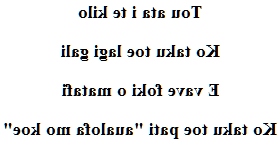Tuvaluan love poem
Kilo
Tou ata i te kilo
Ko taku toe lagi gali
E vave foki o matafi
Ko taku toe pati "aualofa mo koe"

Two other versions
Tou ata ite kilo
Kote galiga o taku kupu
Fakavave me vave o matafi
Ko taku toe muna "toku alofa mo koe"!
Tou Ata i te kilo
E aumai neia mafaufauga gali kia au
Kae vave foki o matafitafi atu keatea
Konei aku toe pati mo koe taku pele "au e alofa atu"
Eiy wanga dugin "nga ebonuw"!

→ French poem ←
Tuvaluan language
Tuvaluan (Tuvalu, Ellice, Ellicean, South Tuvaluan, North Tuvaluan, Nukufetau, Nukulaelae, Funafuti, Nanumanga, Nanumea, Niutao, Vaitupu, Autonym : Te ’gana Tūvalu), is the national language of Tuvalu (Ellice) (capital Funafuti).
Only 13,000 people in the world, if you include expatriates, mainly in Fiji, Nauru, Kiribati, Marshall, United States and New Zealand, will be able to understand my love poem translated into this Polynesian language, close to Samoan and Tokelauan.
As Tuvalu is made up of islands, it is easy to understand that each one has a dialect. If in general we separate these dialects into two groups (those of the north and those of the south), it should be noted that they are largely mutually understandable, and the standard ('gana māsani - the common language), is based on those from Funafuti and Vaitupu.
The Tuvalu
Tuvalu (ancient Ellice) is an archipelago of 9 atolls located in the heart of the Pacific Ocean. It is one of the smallest states in the world (24 km²), and its Polynesian language, is considered in danger.
Tuber crops, a small coastal fishery and a few exports of copra are insufficient resources for its densely populated population. A part of the Polynesians who live there must be expatriated. The sale of stamps collection is an important resource.